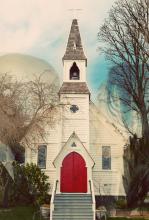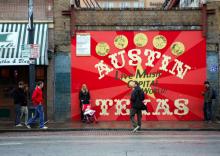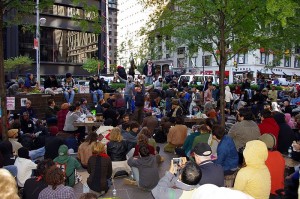Texas

Life is difficult. It can knock you down. Sometimes, an entire nation gets knocked down.
First it was Boston. Some mad man (or men) lays waste to one of America’s most hallowed sporting events — the Boston Marathon. Sidewalks that should have been covered with confetti were covered in blood.
Then it was the quintessential small Texas town of West. Populated by hearty Czech immigrants, folks in West worked hard in their shops, bakeries, and fertilizer plant until the plant exploded. A magnitude-2.1 on the Richter scale, witnesses compared it to a nuclear bomb. Dozens are feared dead.
In the nation’s capital, we had the bitter realization that something is broken that will not be easily repaired. A commonsense proposal that emerged from the Newtown, Conn., tragedy, background checks to prevent convicted felons and the seriously mentally ill from purchasing guns online or at gun shows, fell prey to Washington gridlock. None of the Newtown proposals — the ban on assault weapons, limits on the number of bullets a gun can hold or expanded background checks — could garner the 60 votes necessary to overcome a Senate filibuster.
Finally, there were the ricin-laced letters sent to a Republican senator and the president.

The notion of religious liberty has lately conveyed an impoverished attitude toward the common good among Christians. Namely, “we’ll pay for what we like, and won't pay for what we don’t.”
This stubbornness cropped up last week in College Station, Texas, when the student senate at Texas A&M voted for students to have the privilege of diverting tuition payments from services they object to on moral grounds. Named the “Religious Funding Exemption Bill,” the broadened proposal’s original language (“GLBT Funding Opt Out Bill”) specifically targeted funds going to the campus’ GLBT Resource Center.
Missing from the media coverage was a real look at the bill’s usage of religious exemption — or more specifically, its misuse. In its bill, the student government at A&M confused religious liberty with religious control, and managed to do a good degree of community damage in the process.

When disgruntled congregations have left hierarchical denominations such as the Episcopal Church, they’ve often lost property battles as civil courts ruled buildings and land are not theirs to keep.
But outcomes could be different this year, court watchers say, as high-profile cases involving dozens of Episcopal congregations in South Carolina and Texas wind their way through state courts. That prospect has observers watching for insights that could shape legal strategies in other states and denominations.
Both cases involve conservative dioceses that voted to leave the Episcopal Church over homosexuality, among other issues. In South Carolina, congregations representing about 22,000 people are suing the Episcopal Church for control of real estate worth some $500 million and rights to the diocese’s identity. In Texas, the national Episcopal Church is suing about 60 breakaway congregations in the Fort Worth area for properties estimated to be worth more than $100 million.

AUSTIN, Texas — After a walk around the Texas Statehouse, it became clear they tell a different history here.
Inside the Capitol is a large painting of a onetime Tennessee congressman named David Crockett, who failed in a re-election bid and stormed out west to join the revolution in what was then called Tejas. He arrived in 1836 and died four weeks later at the Alamo in San Antonio.
A plaque beneath the oversized painting suggests Crockett was a laborer who became larger than life when he got to Texas. A more balanced account suggests Crockett had been building his legend for many years, with exotic garb, a self-published autobiography, and fiery speeches against President Andrew Jackson. He yearned to star in Washington, and when that failed, he went west, landing at the Alamo just in time to die there.
An ambitious state needs its mythology.
Cheerleaders at an East Texas high school are fighting their school district’s orders to stop using Bible quotes on their signs at football games.
In August, cheerleaders at Kountze High School, a school with fewer than 500 students 30 miles north of Beaumont, Texas, began painting Bible verses on large paper signs football players burst through at the beginning of games.
But this week, Kountze Independent School District Superintendent Kevin Weldon called for an end to the banners after consulting with a legal adviser at the Texas Association of School Boards.
“It is not a personal opinion of mine,” Weldon told KHOU, a Houston television station. “My personal convictions are that I am a Christian as well. But I’m also a state employee and Kountze ISD representative. And I was advised that such a practice would be in direct violation of United States Supreme Court decisions.”
That prompted the cheerleaders and their supporters to launch a Facebook page, “Support Kountze Kids Faith,” which attracted 34,000 members in its first 24 hours — more than 10 times the population of Kountze.
Parents of at least three cheerleaders have hired an attorney and are considering suing the school district.
[view:media=block_1]
After Walmart closed up shop in McAllen, they left 124,500 square feet of retail space behind for use by the city.
Rather than bring in another big box corporation to pick up where Walmart left off, the southern Texas city decided to turn the building into its new public library. And not just any public library neither: Upon its completion, the McAllen Public Library became the largest single-story library in the United States.
The project was massively successful: Registration by first-time patrons went up by 23% in the library's first month of operation, and its "functional, flexible and affordable" interior — constructed by Minneapolis-based Meyer, Scherer & Rockcastle, Ltd. — was recently named winner of the International Interior Design Association's 2012 Library Interior Design Competition.
Read the full report HERE.
WASHINGTON --- An appeal over Christmas sweets turned bitter on Monday (June 11) when the U.S. Supreme Court declined to hear the so-called “Christian candy cane” case.
The case out of Texas has become a rallying point for conservative Christians concerned about free religious expression in public schools and students' ability to distribute religious literature.
The case, Morgan v. Swanson, kicked off nine years ago in the Plano Independent School District as principals prevented self-described evangelical students from distributing religious literature on school grounds.

Politico is reporting that President Obama is planning to reject the Keystone XL pipeline this afternoon.
Here’s a quick roundup of some reasons why we think that’s awesome:
Yes, the Obama administration is going to have differences with some of the Catholic bishops. But that doesn’t mean it’s a war.
The Governor should know that if he was elected President he would have some big problems with the bishops as well.
Remember when Perry boasted about how many people had been executed in Texas? And how the crowd responded by cheering?

This Sunday (11/6), is precisely one year from the 2012 General Election where the next U.S. President will be elected, and to mark the date, thousands of people from across the country plan to gather at the White House.
But we're not gathering to celebrate, have a sit-in, or even march in protest. Instead, we plan to surround the White House -- literally -- in a Circle of Hope that could be as large as a mile or more in circumference.
From our Circle of Hope we will call upon President Obama to reject the dirty-oil, Keystone XL pipeline Big Oil wants to build from the Canadian tar sands in the Alberta province 6,000 miles south -- straight through the American Heartland -- to the oil refineries along the Gulf Coast of Texas.
Sojourners Associate Editor Rose Marie Berger addresses hundreds gathered near Freedom Plaza in Washington, D.C. last week, to protest the Keystone XL oil pipeline.
We've compiled a list of links where you can learn more about the genesis of the #OccupyWallStreet movement, including links to news reports, organizations involved in formenting the movement and local groups in every state where you can get involved close to home (if you don't live in Lower Manhattan.)
Rick Perry was recently asked by a nine-year-old "If you were a super hero, what kind of super hero would you be?" His answer to the child's benign question was simultaneously predictable and profound: Superman.
Thank you for the recent John Fea essay ("Those Who Will Not Learn from History," May 2010) on the educational lunacy going on in Texas.
As BP's oil spill in the Gulf of Mexico worsens by the day, the world's eyes are on the http://www.bp.com/sectiongenericarticle.do?categoryId=9014510&contentId=...
Like it or not, the far-Right members of the Texas State Board of Education may have already decided what your children will learn about American history.
